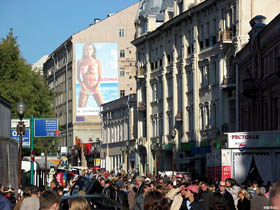
New Moscow leaves the old one in ruins
 |
Inside the small restaurant named Stanislavskogo 2, curtains and pictures, lamps with fringed shades, and classical music flowing from the piano kindly invite the guest to sit in a cozy corner of old Russia.
Outside on the street is the aggressive new Moscow, where developers with good connections thrive like fish in water, who - when money and legal tricks fail - use violence and arson to "devour" old buildings, like the one housing Stanislavskogo 2.
The business now faces danger, and if loud voices sound outside at night, 38-year-old Emilie Souptelová, her mother Rosalie Korodžijevskaja, and their two dogs nervously lift their heads simultaneously.
In recent years, developers have surprisingly quickly torn down many buildings in the center of Moscow, thus ripping the soul from a large part of this indifferent, strange city. They have plunged lovers of old Moscow into despair, whose voices have almost no chance against the omnipotent force of money and politics, and which the public - increasingly passive in the face of the powerful - ignores.
The central part of the metropolis announced last year that it plans to demolish or reconstruct up to 1200 buildings. According to conservationists, "renovation" is often just a cover for destruction.
Moscow's First Deputy Mayor Vladimir Resin announced in August that the city plans to build 60 skyscrapers in the next ten years, some of which will be up to 50 stories high.
"The tiger always needs meat," says Alexei Komech from the Ministry of Culture. "So it's clear to us that from now on we can expect new projects, new ring roads, new tunnels. There’s so much money in Moscow now that you can't even imagine it."
Emilie Souptelová and her mother resist - they are the last of twelve families in a 250-year-old house, where they live and work just a few blocks from the Kremlin. In the narrow winding streets behind them, cranes and demolition weights are busily at work, replacing houses like theirs with new buildings.
Both women are fighting in court against a developer who wants to build a luxury residential building in a city that now has some of the highest real estate prices in the world. They have only a small chance. Moscow's history is rushing forward like a Russian troika, and Emilie Souptelová and her mother belong to the past.
Modern Moscow, emerging from the ruins of the old, is a city of its time - nonchalant, glittering, kitschy, superficial. It is the work of wealthy people (many would say shameless and corrupt) - the "new Russians."
"They have not a shred of a sense of their own identity," says Komech about the creators of the new Moscow. "They just want to be as rich as people in the West, they want to live in the same buildings and drive the same cars."
In a Russia that doubts itself, bigger has always been better, Komech believes. "You know the joke from the Soviet era - our dwarf is the biggest in the world."
Across society - in entertainment, literature, fashion, humor, and architecture - Russia is sinking into a swamp of bad taste, according to old Russians.
"Russia is in the midst of a cultural collapse, and there is nothing we can do about it," declares David A. Sarkisjan, director of the State Museum of Architecture. "It is a terrible crime. The old generation of cultured people is dying out. And no one is taking their place."
The voice of the future - and evidently the voice of the majority - comes from people like 27-year-old Katrina Semichatová, a public relations representative for a large Moscow development company.
"I do not consider Moscow to be a beautiful city," she says, gazing at a large construction site on the banks of the Moskva River, where a new business and residential center is rising. "I think Moscow has to be better. Now we have a chance to build a whole new city."
In the next two months, an arbitration court is set to decide whether Emilie Souptelová and her mother can stay in the apartment where they have lived for 35 years and which they claim to own according to post-Soviet documents.
But the developer has his reasons for complaints as well. He has spent a lot of money on a building he thought was available.
"They just want to drive us out of here," says Emilie. "They told me: 'What the hell are you doing here? Who are you? Our plans do not include you, Ms. Emilie.'”
She has won two rounds in lower courts. But now she fears that money and connections in the corrupted and flawed judicial system will turn the case against her in the final legal round.
And even if she were to win in court, she fears that the developer, in an attempt to evict her, might resort to more drastic methods. "For now, he hopes to deal with us officially," states Emilie. "If we win, he will be extremely angry."
The English translation is powered by AI tool. Switch to Czech to view the original text source.
0 comments
add comment







